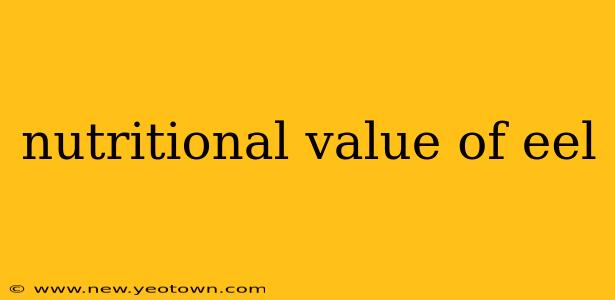The Surprising Nutritional Powerhouse: Uncovering the Nutritional Value of Eel
Eels, those long, serpentine creatures of the water, often evoke a sense of mystery. But beyond their intriguing appearance lies a surprisingly rich nutritional profile. For centuries, eels have been a culinary delicacy in many cultures, prized not just for their unique flavor but also for their nutritional benefits. Let's dive deep into the world of eel nutrition, exploring its various components and health implications.
What are the health benefits of eating eel?
Eels are a fantastic source of several essential nutrients. They are particularly rich in high-quality protein, crucial for building and repairing tissues, supporting a healthy immune system, and maintaining overall bodily functions. This protein is easily digestible, making it a valuable option for those seeking a readily available protein source.
Beyond protein, eels boast an impressive array of vitamins and minerals. They are a significant source of vitamin B12, vital for nerve function and red blood cell production. A deficiency in B12 can lead to serious health problems, highlighting the importance of including B12-rich foods like eel in a balanced diet. They also offer a good supply of vitamin A, essential for vision, immune function, and cell growth, and niacin (vitamin B3), crucial for energy metabolism and DNA repair.
Moreover, eels contain various minerals, including phosphorus, important for bone health and energy production; potassium, essential for maintaining healthy blood pressure; and selenium, a powerful antioxidant that protects cells from damage.
Is eel high in Omega-3 fatty acids?
Yes, eel is a good source of omega-3 fatty acids, although the exact amount can vary depending on the species and its diet. Omega-3s are essential fatty acids known for their heart-protective properties, their role in reducing inflammation, and their positive effects on brain health. Including foods rich in omega-3s, like eel, as part of a heart-healthy diet is recommended.
How many calories are in eel?
The calorie content of eel varies depending on the preparation method and portion size. However, generally speaking, eel is a relatively high-calorie food. It's important to consume eel in moderation as part of a balanced calorie intake to support weight management.
Is eel good for weight loss?
While eel offers numerous nutritional benefits, its relatively high calorie content and fat content mean it's not typically considered a weight-loss food. Incorporating eel into a balanced, calorie-controlled diet might be feasible for some, but it shouldn't be relied upon as a primary weight-loss strategy.
What are the potential downsides of eating eel?
While generally safe for consumption, there are some potential downsides to consider. Eels can accumulate heavy metals like mercury from their environment. Therefore, it's crucial to source your eel from reputable suppliers who prioritize sustainable practices and ensure low levels of mercury contamination. Additionally, some individuals may be allergic to eel, experiencing symptoms ranging from mild skin reactions to severe allergic responses.
What are some healthy ways to cook eel?
Eels can be prepared in a variety of ways, offering versatility in the kitchen. Grilling, baking, and steaming are healthier cooking methods that minimize added fats and oils. Marinades and flavorful sauces can enhance the taste without compromising the nutritional value.
Conclusion:
Eel is a nutritional powerhouse offering a rich source of protein, vitamins, minerals, and omega-3 fatty acids. However, it's crucial to consume it in moderation, choosing responsibly sourced eels to minimize potential risks associated with heavy metal contamination. Like any food, moderation and balance are key to reaping the benefits while minimizing potential downsides. Enjoy this unique culinary experience while appreciating the nutritional wealth it brings to your plate!

